Medical staff and patients fight against cancer together: multi-disciplinary treatment team helps pancreatic cancer patient get rid of "dilemma" with carbon ion therapy
A pancreatic cancer patient came to our hospital with the tumor compressing and infiltrating the duodenum, causing duodenal obstruction and preventing the intake of food and water. The patient had a feeding tube and a gastrointestinal decompression tube placed. Additionally, due to the pancreatic cancer compressing the common bile duct, biliary obstruction led to jaundice, requiring the placement of a PTCD drainage tube.
The patient also had comorbid heart disease with poor cardiac function (2024-02-28 echocardiography: reduced global left ventricular systolic function, dilated ascending aorta and aortic sinus. EF: 33%. FS: 16%. 2024-03-04 echocardiography: 1. Old myocardial infarction in the left anterior descending artery supply area: myocardial ischemia in the apical inferior wall and lateral wall, ischemic cardiomyopathy. 2. Reduced left ventricular ejection fraction, HFrEF [heart failure with reduced ejection fraction]). With multiple diseases intertwined, the patient suffered greatly and was in poor physical condition.
Our hospital’s multidisciplinary team comprehensively evaluated the patient’s condition and overall health, recommending a treatment strategy combining carbon-ion therapy for pancreatic cancer with synchronous nutritional support and symptomatic management, followed by chemotherapy at an appropriate time. During treatment, medical staff adjusted the plan promptly based on disease progression and provided meticulous care.
Ultimately, the patient achieved complete relief of duodenal and biliary obstruction, with removal of the PTCD tube, gastrointestinal decompression tube, and nasogastric feeding tube. The patient regained the ability to eat normally and has now returned to a normal life.
[Clinical Diagnosis]
Patient: XXX, Male, 69 years old
Diagnosis:
1. Malignant tumor of the pancreatic head (cT4N0M0, Stage III)
2. KPS score: 80
3. Incomplete duodenal obstruction
4. Obstructive jaundice
5. Arrhythmia (ventricular premature contractions)
6. Chronic heart failure
7. Old myocardial infarction
8. Coronary atherosclerotic heart disease
9. Ischemic cardiomyopathy
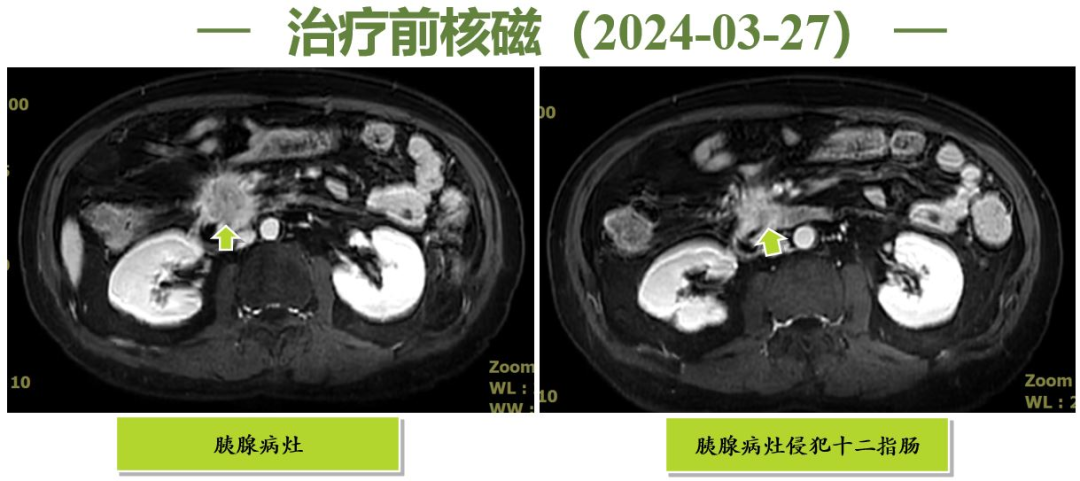
Pre-treatment MRI
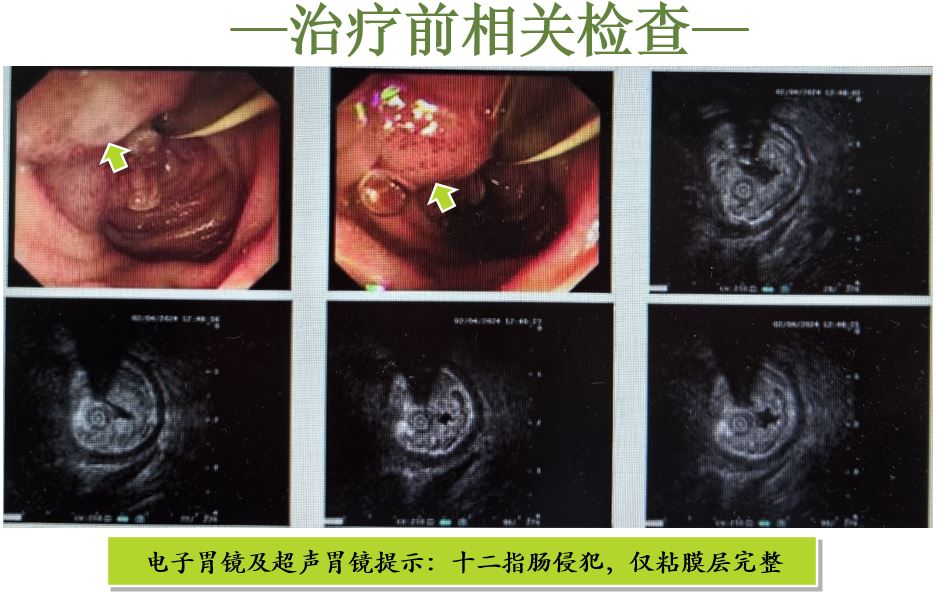
Electronic gastroscopy before treatment
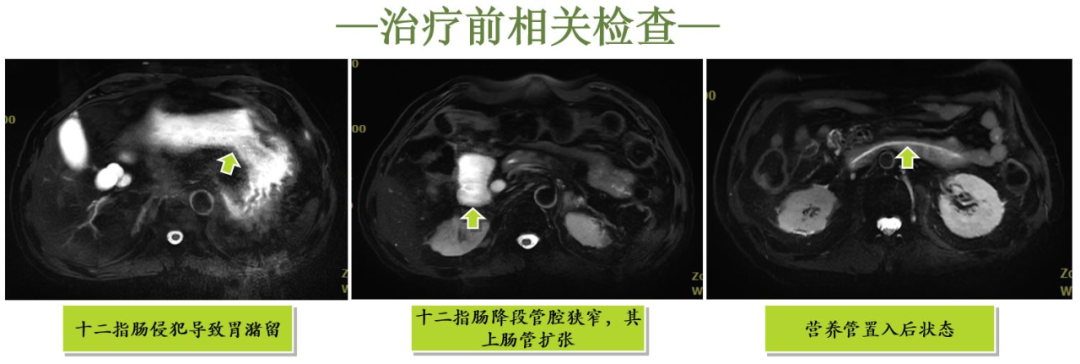
Pre-treatment related examinations
[Treatment Plan]
1. Nasogastric feeding and gastrointestinal decompression for incomplete duodenal obstruction;
2. PTCD drainage for obstructive jaundice;
3. Correction of cardiac function;
4. Carbon ion therapy for the pancreatic head tumor;
5. Scheduled chemotherapy: AG regimen (gemcitabine + nab-paclitaxel) administered for 4 cycles on 2024-05-23, 2024-06-14, 2024-07-05, and 2024-08-01.
[Carbon Ion Radiotherapy Plan]
- Carbon ion radiotherapy dose:
- PTV 36Gy (RBE)/9 fractions, followed by a reduced-field boost.
- PTV boost 18Gy (RBE)/4 fractions, 4.5Gy (RBE) per fraction.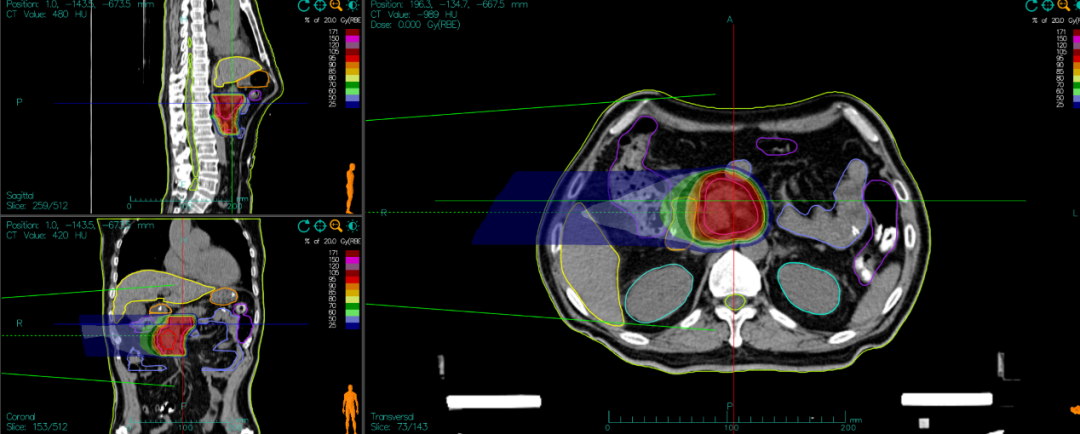
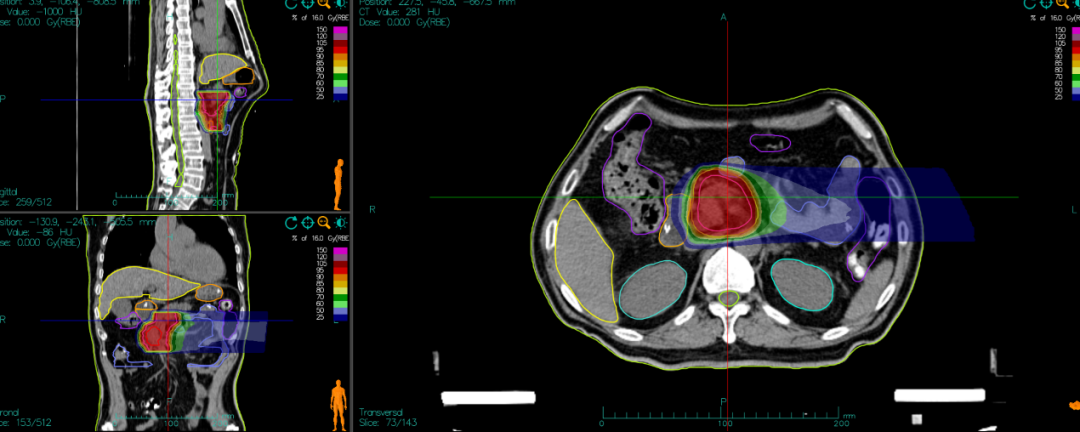
[Treatment Outcome]
CR (Complete Response); After treatment, the patient underwent the following:
- 2024-06-26: Removal of gastrointestinal decompression tube.
- 2024-07-03: Removal of feeding tube, resuming normal oral intake.
- 2024-10: Removal of PTCD tube.
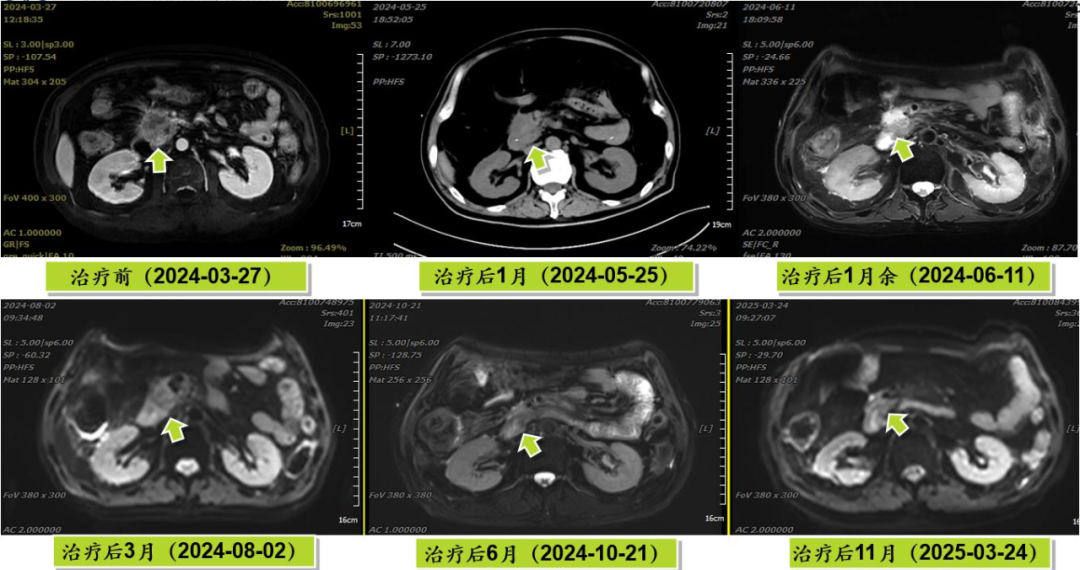
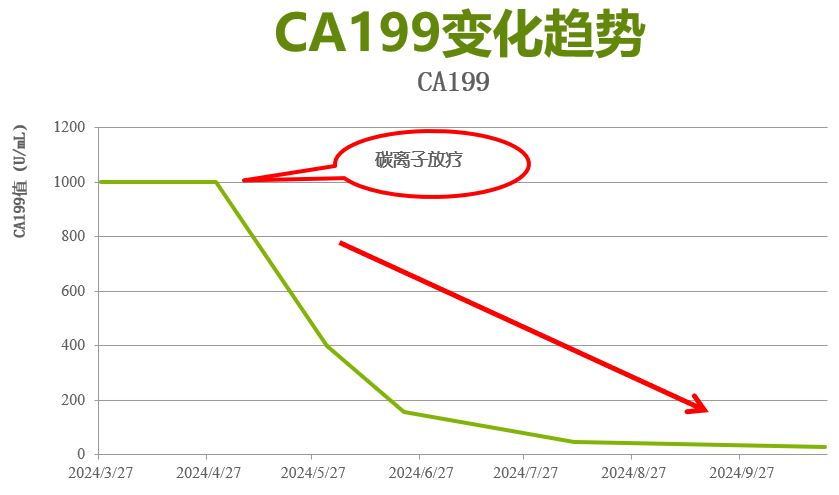
[Reflections]
Pancreatic cancer, especially pancreatic head cancer, due to its unique anatomical location, is highly prone to invading surrounding critical tissues and organs, leading to multiple severe complications and posing significant treatment challenges. Reflecting on this case, the patient's pancreatic head tumor had invaded the adjacent descending and horizontal parts of the duodenum, resulting in duodenal obstruction and gastric retention, with frequent vomiting after eating. Concurrently, biliary obstruction caused obstructive jaundice. Furthermore, the patient had multiple comorbid cardiac conditions and poor cardiac function, making the entire treatment process highly complex and demanding.
Carbon ion radiotherapy, as an advanced radiation therapy technology, possesses unique physical and biological properties. It enables precise targeting of tumor tissue while minimizing damage to surrounding normal tissues, offering significant therapeutic advantages for pancreatic cancers in challenging locations that are difficult to resect surgically. However, the application of new technologies is not without hurdles. The treatment team engaged in repeated discussions and research, tailoring a personalized carbon ion radiotherapy plan based on the patient's specific condition, meticulously defining the irradiation field and dosage. Considering the patient's treatment tolerance, four cycles of standard systemic chemotherapy for pancreatic cancer were administered after radiotherapy, ultimately achieving success and allowing the patient to return to a normal life.
This successful treatment was not only attributable to advanced medical technology but also relied heavily on the collaboration of the entire medical team. Doctors, nurses, technicians, and other personnel worked in clear division yet close coordination. Every step—from formulating the treatment plan to implementing specific procedures, and from patient care during treatment to psychological support—was crucial. At the same time, the patient's active cooperation laid the foundation for this success. The courage and confidence demonstrated by the patient throughout the treatment process provided us with continuous motivation.
This achievement is the result of the team's concerted efforts and, more importantly, a victory in the patient's tenacious fight against the disease. Moving forward, we will carry this conviction with us as we continue to forge ahead on the challenging path of cancer treatment.
[An Exceptional Team Builds a Leading Specialty Department]
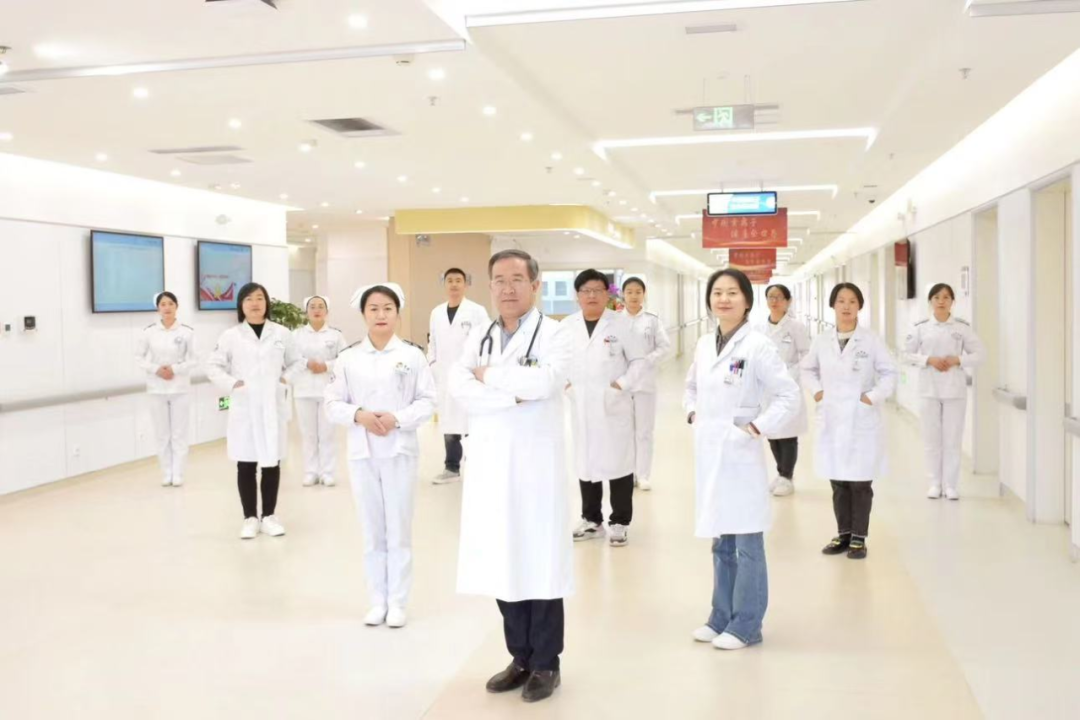
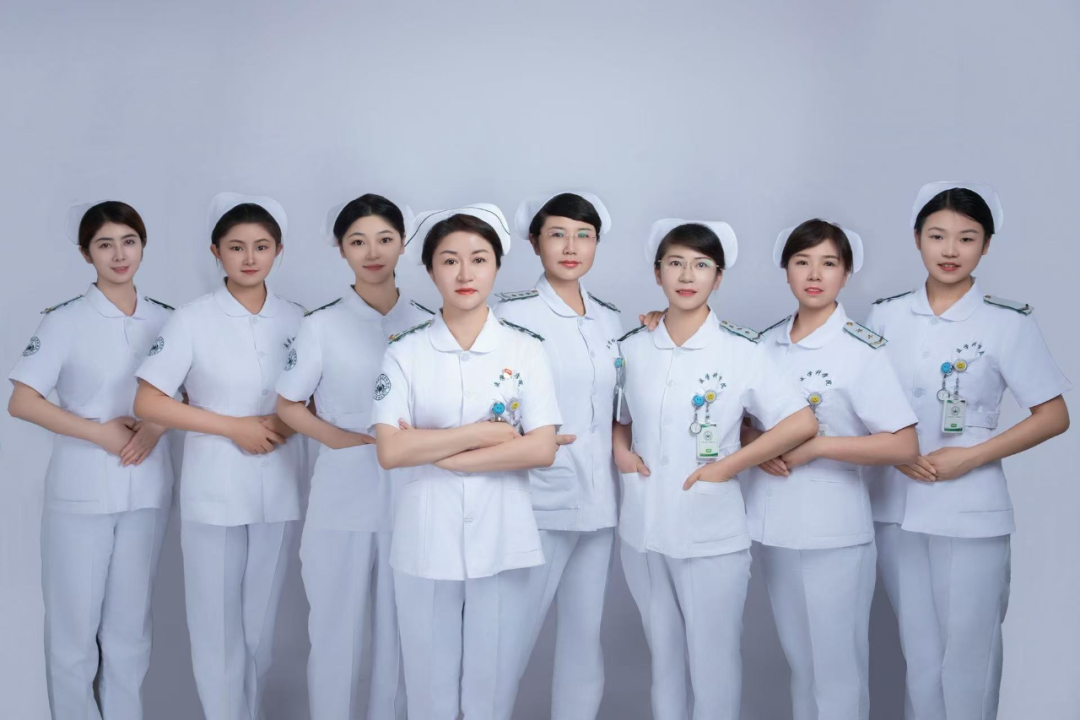
The Radiotherapy Department I currently has 15 medical staff members, forming a highly knowledgeable and dynamic professional team. The department is honored to have Professor Yee-Min Jen, former Director of Radiotherapy at Taiwan's Tri-Service General Hospital, serving as technical and academic advisor. Several physicians have been granted opportunities for advanced training abroad, including exchanges at proton, heavy ion, and photon therapy centers in the United States, Germany, and Japan, where they acquired cutting-edge technologies and broadened their perspectives.
The department director, Associate Chief Physician Ma Youguo, has over 26 years of experience in radiotherapy and has witnessed the growth and development of our hospital's radiotherapy department. He has been dispatched multiple times for advanced training at renowned radiotherapy centers across China, including Sichuan Cancer Hospital and Peking University Cancer Hospital, as well as exchange programs at the Scripps Proton Therapy Center in San Diego, USA, and the NIRS Heavy Ion Medical Center in Japan. He possesses extensive clinical expertise in tumor radiotherapy and chemotherapy.
The department specializes in carbon ion and photon radiotherapy for abdominal and pelvic malignancies such as pancreatic cancer, liver cancer, cholangiocarcinoma, colorectal cancer, renal cancer, prostate cancer, and soft tissue sarcomas, as well as benign conditions including keloids, bone tumors, and vascular malformations. Additionally, it provides comprehensive treatments such as chemotherapy, targeted therapy, immunotherapy, and cellular immunotherapy for various malignant tumors.
Radiotherapy Department I adheres to a "patient-centered" service philosophy, committed to delivering high-quality, efficient, and compassionate medical care. The entire medical team will continue striving to safeguard the health of cancer patients with exceptional medical expertise and noble medical ethics.
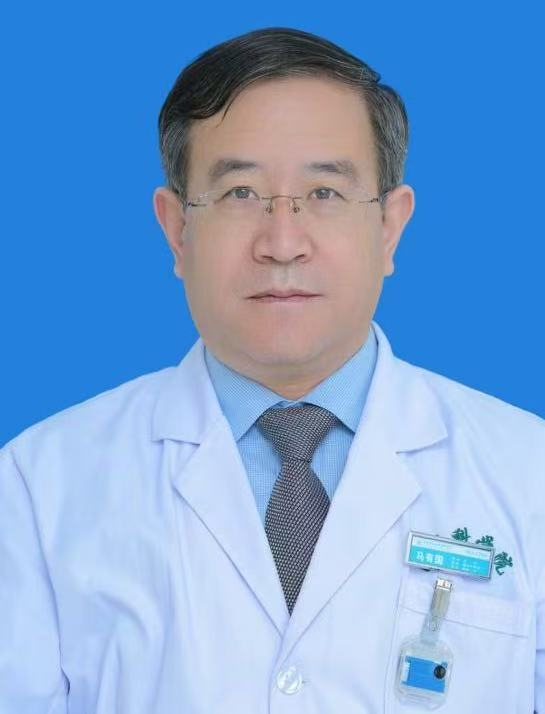
Director of the Department: Associate Chief Physician Ma Youguo
Head Nurse: Chief Nurse Ma Yanping
Hospital Address: Department of Abdominal and Pelvic Diseases, 1st Floor, Building 4, Heavy Ion Center, Gansu Wuwei Medical Science Academy Cancer Hospital
